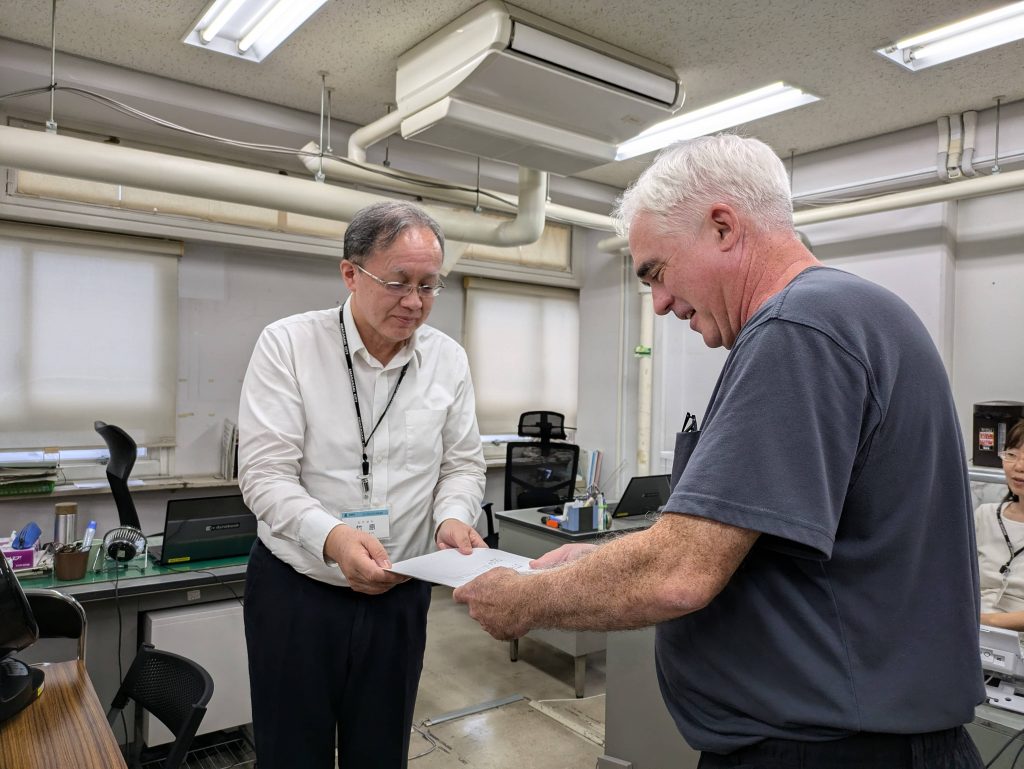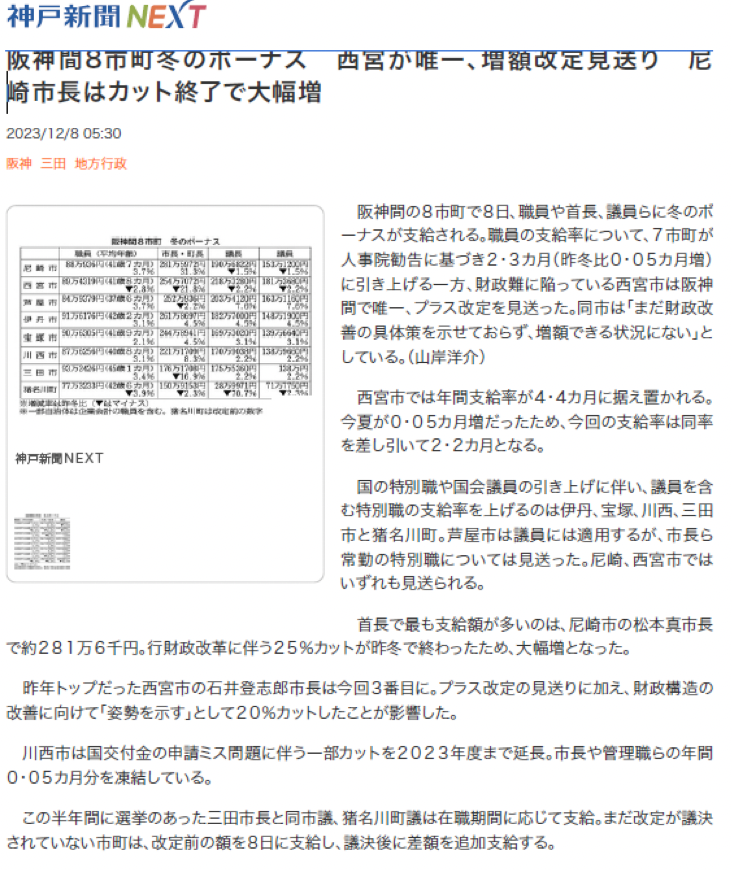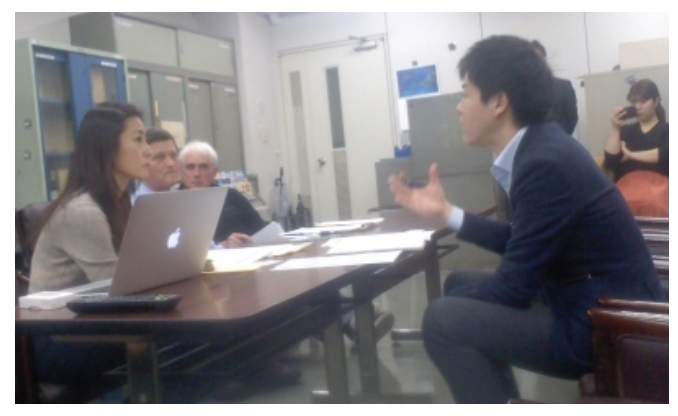Click the button above to jump to the article.
There are also branches in Ashiya City and Itami City.
KATE, Kobe City ALTs
ALT working for Kobe City is called as KATE. They will be transited to Fiscal Year Appointed Employees from April 1st 2020. EWA started negotiation with Kobe City in order to keep and improve their wage and working conditions. It will last for months becuase Kobe City has not made a plan for it.
Successful EWA Negotiations with Kobe City
by EWA Kobe Branch
There was a most favorable result from ongoing negotiations between EWA and the Kobe Board of Education on February 5, 2020 at the BOE facilities at the Kobe Harborland Central Building Center.
Negotiations on behalf of the Kobe Area Teachers of English (or KATES) by EWA were successfully led by Satoe Sakai and Neo Yamashita.
The Kobe BOE had in earlier negotiations proposed introducing a Public Recruitment System for the positions currently held by KATES, with a limit to the number of times KATES could apply for employment under such a scheme. However in the previous negotiation session Ms. Sakai, Mr. Yamashita and the KATES had argued convincingly against the implementation of such a system. On February 5, the Kobe BOE accepted the EWA position and canceled their plans to establish public recruitment. The about turn was quite a victory for the union – in particular the dropping of the proposed arbitrary limit for how long KATES could continue to work for Kobe City.
The BOE acknowledged the highly valued contribution of KATES to education in Kobe City and stated their intent to continue to employ the current KATES until retirement – an excellent result.
The paid sick leave, until now afforded to KATES, will however, become unpaid sick leave from April 2020, according to the BOE in line with their standardization of conditions among all Fiscal Year Appointed Employees.
This will no doubt be addressed in future negotiations, especially given the financial burden on city employees and the risk to public safety of such a policy (especially with regard to the spread of infectious diseases).
Besides the change in sick leave clause, there will happily be no changes to work conditions for KATES.
The KATES as a group wish to extend their gratitude to EWA for their hard work to achieve the above result.
Amagasaki City ALTs
Amagasaki City ALTs file measures to increase summer bonus with City Equity Committee
On October 23, 2024, 11 directly hired ALTs working at Amagasaki public schools submitted to the City Equity Committee of Amagasaki (kouhei iinkai) a petition demanding measures to improve working conditions by taking appropriate administrative action regarding their summer bonuses.
( As of 23 October 2024, have submitted both parties documents below. )

Fiscal Year Appointed Employees (FYAE, kaikeinendo) have received term-end allowances (kimatsu-teate) from the beginning of the Fiscal Year Appointed Employee system in 2020. But they have not been paid diligence allowances (kinben-teate) which regular employees have enjoyed. This is a big problem since FYAE salary is too low and employment security is too weak, and their resentment against the unfair treatment compared to regular employees has also been a problem since the beginning.
With that in mind, the Ministry of Internal Affairs and Communications (MIC) amended a law to allow diligence allowance to be paid to FYAE from fiscal year 2024 and instructed all municipal governments to pay them without reducing term-end allowance.
In response to this all municipal governments paid both term-end allowance and diligence allowance to FYAEs from June 2024. Amagasaki City also revised its own city ordinance in order to pay both allowances to FYAE, but they decided to pay ALTs a single combined ‘term-end/diligence allowance’ which was only the same amount as last year’s term-end allowance.
At the negotiation EWA questioned that there was no such thing as a combined ‘term-end/diligence allowance’. The Amagasaki City Board of Education corrected themselves and split the ‘term-end/diligence allowance’ into both a term-end allowance and a diligence allowance but failed to show the yen amount of each allowance. They later responded that they would split last year’s amount into term-end allowance and diligence allowance but the total amount remained the same. This would mean reducing the term-end allowance and paying a diligence allowance, something the MIC had strictly banned them from doing.
ALTs, therefore, decided to request action from the Equity Committee, as they also did last year regarding pay raises.
The City Equity Committee of Amagasaki
Amagasaki City ALTs demand measures to increase wages and lump sum allowance.
On December 14, 2023, 11 directly-hired ALTs working at Amagasaki public schools requested the Amagasaki City Equity Committee to take appropriate administrative action. They filed their case based on Article 46 of The Local Public Service Act.
( As of 17 May 2024, have submitted both parties documents below. )

ALTs directly employed by the Amagasaki Board of Education were converted to kaikeinendo public servants from 2020. Wages of public servants are decided by taking into account living costs, salaries of national public servants and other local municipal public servants, and private company employees (Article 24 of Local Public Service Act).
Amagasaki City has revised (and increased) public servant salaries based on the recommendation of the National Personnel Authority. But, the Amagasaki Board of Education refused to increase ALT wage and bonuses, ignoring the recommendation of the National Personnel Authority at the negotiation with EWA. The Board of Education stated that they intend to keep the current salaries with no change because ALTs are not covered by a pay-scale and receive a higher salary compared to other kaikeinendo public servants.
ALTs have been deprived of their right to strike since they were converted to kaikeinendo public servants. ALTs have therefore requested to the City Equity Committee of Amagasaki that the recommendation of National Personnel Authority as ‘compensatory of labor rights’ must be carried out.
This appears to be the first time in Japan that an ALT has requested these appropriate measures before their city’s Equity Committee.
Here is some background on Amagasaki ALTs wage and bonuses compared to other Amagasaki city public servants and neighboring city ALTs. Amagasaki ALT wages were cut and have remained nearly the same from 2004 while the city mayor and other public servant salaries were also cut but have apparently been recovered (table and figure). Kimatsu-teate term-end bonuses (and from 2024 a kinben-teate diligence bonus) are paid in most of municipal cities based on the recommendation of National Personnel Authority.
Table1

Figure1

The City Equity Committee of Amagasaki 2023.12~
※ Action request forms are available on the Japanese language page.
Collective bargaining 2022
On November 29, 2022 EWA Amagasaki branch conducted a collective bargaining session with the city Board of Education regarding a pay rise, winter bonus and so on. Their wages have been suspended since their status was transferred to Fiscal Year Appointed Employee in April 2020. In addition, the retirement allowance (in the name of a severance payment) system will be eliminated as of the end of March 2023. While at the same time ALTs have suffered from inflation and the weakened Yen.
Taking this into account, the Union demanded a pay increase and bonus calculated at the same percentage as Japanese colleagues.
However, the City and the City Board of Education responded that they could not raise ALT wages because ALT wages are fixed salaries not based on a salary scale and because of comparisons with ALTs in other cities and other fiscal year appointees. They also threatened ALTs that they will decrease their monthly salaries if they increase bonuses, though they have increased the salaries of other part-time employees as compensation of bonuses increase recommended by Japanese Government. Union requested the disclosure of wage data of part-time city employees and agreed with BoE to resume the collective bargaining when the above mentioned data is handed out the union.
Stop dispatch ALTs
Amagasaki City introduced dispatch ALTs in 2020 fiscal year. The working conditions of dispatch ALTs are not good and one-third of them are replaced every year. The doubt about the quality of English education which must be provided by native English speakers is emerging.
The Union pointed out that City Board of Education will have to hear the opinion of a person who represents a majority of city employees in order to extend the dispatching period for 2023 and beyond based on the Worker Dispatching Act. They replied that they are now consulting with the competent authority how to proceed the extension of dispatching. The union, being opposed to the dispatching of workers, requested that an announcement be made regarding the procedures for selecting a representative of the majority of the workers, as they were planning to run for the position.
Collective bargaining with Amagasaki Board of Education concerning the change to Fiscal Year Appointed Employee concludes.
After almost a year of hearing ‘We don’t know yet’,’We are still deciding’, ‘We are making a plan’ and facing an April 1st deadline, Amagasaki decides to leave everything exactly as it is. No changes. Current ALTs will be converted to the new system without following any of the guidelines for the new system. Confused? So are we.
While we are relieved that the city has followed the National Diet’s directive that there must not be any detrimental changes to current conditions, we are extremely disappointed that the Board of Education decided to ignore the Ministry of Internal Affairs guidelines to initiate bonuses. For over 10 years we have been arguing that non-regular employees who perform equivalent work as regular employees should receive the same rate of bonus. We have cited several court cases including Supreme Court decisions which have supported our arguments. Now the national government is agreeing with us as well, and stating that non regular city employees should receive 2.6 months salary in bonus. Amagasaki’s reaction has been a consistent ‘No’. In the past their reason has been that the court decisions don’t apply to our situation. City finances were bad and they couldn’t afford to pay equivalent bonuses. Their reason now- ALT salaries are already “very high”. Well at least they are finally being honest about their opinion. We will keep fighting and continue to demand that the city initiate bonuses in upcoming collective bargaining.
In another baffling decision, the BoE has decided to hire 8 out-source ALTs instead of simply hiring 8 more of the current direct hire ALT. Despite our arguments against outsourcing in general and the problems presented by this kind of ALT they are going forward. We also reminded them of the upcoming changes to the Dispatch Law making it more difficult to pay outsourcing staff less than current workers simply to save money. We will continue to monitor the situation.
Ashiya City ALTs
Itami City ALTs & JTEs
NET, Osaka Prefecture ALTs
Since the beginning of the NET Program almost 30 years ago, native English teachers have had many of the same benefit as all Japanese teachers, including health care. If we get sick or need to be admitted to a hospital, they we can take paid sick leave for up to 20 days per year, as long as a medical doctor requires it.
However, from April 2020, we have been informed by our incompetent managers at the Osaka Board of Education that we will be permitted NO days of paid sick leave.
In other words, we must be in school, even when sick or we will not get paid. For example, if a native English teachers feels sick with even flu-like symptoms, he or she will be more likely to go to school and teach than visit a doctor.
The risk is too high to students and teachers alike. Most native English teachers teach more than 360 students a week. We must be able to take paid sick leave to protect our health and the health of our students.
While this reduction in health benefits is the most pressing, there four are other aspects that are also important.
1.Since 1996, we have not had a salary increase or a cost of living adjustment. We demand an annual salary increase similar to all teachers.
2.Native English teachers receive no pension benefits. Upon retirement, we will get no financial support. We demand pension benefits similar to all teachers.
3. Paid vacation days are being reduced for new teachers from 20 days to 10 days. We demand vacation days similar to all teachers.
4. There will no longer be any benefit for NET teachers to return to their home country for bereavement or for weddings of family members. We demand that we be allowed to return to our home countries in the case of bereavement and not be financially penalized.
See the article below.
For Japan’s nonregular workers, a weaker safety net as COVID-19 spreads

Osaka Prefecture finally approves paid sick leave for ALTs and NET teacher
– After more than three years of collective bargaining by the union and requests for action to the Personnel Committee, this has finally been achieve –
Aug. 26th, 2024
On the 26th August, Osaka prefectural Board of Education announced new conditions for Foreign language teachers (NET) and assistants (JET) giving them special paid leave, specifically 20 days of paid sick leave per year and 1 hour of special leave per day to ease travel burdens for expectant mothers.
The EWA has been strongly demanding paid sick leave for NETs since the introduction of the Fiscal Year Appointed Employee (FYAE) system in 2020. Not only did Osaka prefectural BoE fail to agree to our demands, they also did not consider allowing paid sick leave throughout the novel coronavirus pandemic lasting until May 2023. After the novel coronavirus was downgraded to regular influenza, the EWA, during our collective bargaining in January 2024, again demanded paid sick leave and regular wage increases recommended by the Equity Committee. (EWA newsletter #702) In that meeting, the BoE did not admit that national part-time workers were ineligible for paid sick leave under the FYAE system. Due to this response, the EWA, acting as advisor to the union member representative, submitted a request for implementation of our demands to the Equity Committee.
In May 2024, the BoE refuted our demands for Osaka to recognize paid sick leave, replying that it was unreasonable to treat prefectural part-time workers differently to national part-time workers. The EWA is treating the BoE’s recent offer as a victory, however we requested an explanation for their sudden change in thinking. The BoE replied that they were simply conforming to ALT work conditions in other prefectures in order to ensure sufficient future ALT recruitment in Osaka. Since July 2023 Osaka has been employing ALTs under the JET program, and although there are many difficulties in applying similar working conditions under this system uniformly Japan-wide, they have received paid sick leave. For this reason NETs in Osaka have also been granted paid sick leave too.
The EWA accepted the terms of the proposal while pointing out that the BoE should have acted more promptly and positively in issuing this proposal since it was one of our key requests in the submission of demands.
NET (Osaka Prefecture ALT) also demand action from the Osaka Prefecture Personnel Committee.
March 12th, 2024

Seven foreign language (English) instructors (NET) working in Osaka Prefecture submitted a request to the Osaka Prefecture Personnel Committee on 12 March 2024, demanding an increase in their monthly salary and paid sick leave in line with the Personnel Committee’s recommendations.
Adverse changes in the Local Public Service Act.
Similar demands have already been made by foreign language teaching assistants (ALT) in Amagasaki City, while Osaka NET are also demanding paid sick leave.
As noted in the article above, NET were entitled to up to 20 days of paid sick leave and other special leave per year until they were reclassified as fiscal year appointees in FY2020. However, upon this change in status, the Osaka Prefectural Government and Board of Education abolished sick leave and special leave for NET, claiming that they were equivalent to part-time government employees. The union demanded that paid sick leave be maintained, at least for infectious diseases such as influenza, but the abolition remained.
Later, however, with the outbreak of the new coronavirus, all staff, including NETs were granted a wide range of leave or exemption from work if they were ill or feared to be ill. Although these measures have now ceased due to the change of the new coronavirus to category 5, the requirement for workers to recuperate safely and prevent infection should be reconsidered.
Now is the time to reconsider!
In order to make the Prefecture and the Prefectural Board of Education reconsider, the union widely called on NET working in the Prefecture to demand action from the Personnel Committee together. Despite the short preparation period, seven people, including union members, agreed and submitted their demands.
Will it work as a compensatory measure?
On 29 March, the Personnel Committee informed us that the request for measures had been accepted and that it will now examine the requests of the seven members together. Please keep an eye on the future examination to see how the recommendations of the Personnel Committee and the Personnel Committee system, which are compensatory measures for restrictions on basic labour rights, will function.

What is Fiscal Year Appointed Employee?
As of April 1st 2020, all ALTs around Japan will be transitted to Fiscal Year Appointed Employees. What is that? We provide you with the information and strategy to fight it below.
How will the amendments of the Local Public Service Act
and Local Autonomy Act affect ALTs?

